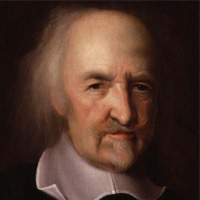Thomas Hobbes - Biography and Works
Thomas Hobbes (1588-1679) is regarded as the best known English political philosopher and a representative critic of the time. He is famous for his book Leviathan (1651) where he develops his famous political and aesthetic theory.

Thomas Hobbes (1588-1679)
Hobbes wrote various topics and issues including the most famous three sources of political philosophy; The Element of Law (1640), De Cive 1642 (On the citizen) and Levianthan (1651). Hobbes came to believe that his theory in "The Element of Law" justified obedience to any strong sovereign power, whether royalist or not, it was originally put forward by a man who preferred rule by kings to government by representative assemblies. The political theory propounded by The Element of Law was practiced by royalists in parliamentary debates.
Hobbes regarded De Cive (known in the English translation, first published in 1651, as Philosophical Rudiments concerning Government and Society) the most genuinely scientific of all in terms of the achievement in political philosophy. De Cive opens with a strong denial of the Aristotelian maxim that man is by nature fit for life in the polity. Life in the state does not come naturally to human beings, according to Hobbes, and once government is established, it is always at risk from the ‘manners’ of some human beings and the natural situation of all human beings.
As Hobbes's political philosophy is strongly anti-Aristotelian, so his metaphysics and natural philosophy belong to the movement of ideas - so-called modern philosophy - that began to supersede Aristotle and the scholastics in the seventeenth century. From 1640 to 1650, a time spent in exile in Paris, Hobbes became a member of a group of self-consciously 'modern' philosophers.
